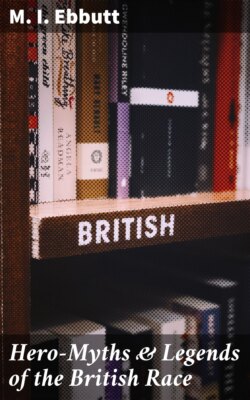Читать книгу Hero-Myths & Legends of the British Race - M. I. Ebbutt - Страница 20
На сайте Литреса книга снята с продажи.
Beowulf and the Fire-Dragon
ОглавлениеTable of Contents
In the fiftieth year of Beowulf’s reign a great terror fell upon the land: terror of a monstrous fire-dragon, who flew forth by night from his den in the rocks, lighting up the blackness with his blazing breath, and burning houses and homesteads, men and cattle, with the flames from his mouth. The glare from his fiery scales was like the dawn-glow in the sky, but his passage left behind it every night a trail of black, charred desolation to confront the rising sun. Yet the dragon’s wrath was in some way justified, since he had been robbed, and could not trace the thief. Centuries before Beowulf’s lifetime a mighty family of heroes had gathered together, by feats of arms, and by long inheritance, an immense treasure of cups and goblets, of necklaces and rings, of swords and helmets and armour, cunningly wrought by magic spells; they had joyed in their cherished hoard for long years, until all had died but one, and he survived solitary, miserable, brooding over the fate of the dearly loved treasure. At last he caused his servants to make a strong fastness in the rocks, with cunningly devised entrances, known only to himself, and thither, with great toil and labour of aged limbs, he carried and hid the precious treasure. As he sadly regarded it, and thought of its future fate, he cried aloud:
“Hold thou now fast, O earth, now men no longer can,
The treasure of mighty earls. From thee brave men won it
In days that are long gone by, but slaughter seized on them,
Death fiercely vanquished them, each of my warriors,
Each one of my people, who closed their life-days here
After the joy of earth. None have I sword to wield
Or bring me the goblet, the richly wrought vessel.
All the true heroes have elsewhere departed!
Now must the gilded helm lose its adornments,
For those who polished it sleep in the gloomy grave,
Those who made ready erst war-gear of warriors.
Likewise the battle-sark which in the fight endured
Bites of the keen-edged blades midst the loud crash of shields
Rusts, with its wearer dead. Nor may the woven mail
After the chieftain’s death wide with a champion rove.
Gone is the joy of harp, gone is the music’s mirth.
Now the hawk goodly-winged hovers not through the hall,
Nor the swift-footed mare tramples the castle court:
Baleful death far has sent all living tribes of men.”
When this solitary survivor of the ancient race died his hoard remained alone, unknown, untouched, until at length the fiery dragon, seeking a shelter among the rocks, found the hidden way to the cave, and, creeping within, discovered the lofty inner chamber and the wondrous hoard. For three hundred winters he brooded over it unchallenged, and then one day a hunted fugitive, fleeing from the fury of an avenging chieftain, in like manner found the cave, and the dragon sleeping on his gold. Terrified almost to death, the fugitive eagerly seized a marvellously wrought chalice and bore it stealthily away, feeling sure that such an offering would appease his lord’s wrath and atone for his offence. But when the dragon awoke he discovered that he had been robbed, and his keen scent assured him that some one of mankind was the thief. As he could not at once see the robber, he crept around the outside of the barrow snuffing eagerly to find traces of the spoiler, but it was in vain; then, growing more wrathful, he flew over the inhabited country, shedding fiery death from his glowing scales and flaming breath, while no man dared to face this flying horror of the night.
The news came to Beowulf that his folk were suffering and dying, and that no warrior dared to risk his life in an effort to deliver the land from this deadly devastation; and although he was now an aged man he decided to attack the fire-drake. Beowulf knew that he would not be able to come to hand-grips with this foe as he had done with Grendel and his mother: the fiery breath of this dragon was far too deadly, and he must trust to armour for protection. He commanded men to make a shield entirely of iron, for he knew that the usual shield of linden-wood would be instantly burnt up in the dragon’s flaming breath. He then chose with care eleven warriors, picked men of his own bodyguard, to accompany him in this dangerous quest. They compelled the unhappy fugitive whose theft had begun the trouble to act as their guide, and thus they marched to the lonely spot where the dragon’s barrow stood close to the sea-shore. The guide went unwillingly, but was forced thereto by his lord, because he alone knew the way.
